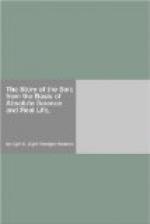“’In all this book learning is available. A capacity and taste for reading gives access to whatever has already been discovered by others. It is the key, or one of the keys, to the already solved problems. And not only so; it gives a relish and facility for successfully pursuing the unsolved ones. The rudiments of science are available, and highly available. Some knowledge of botany assists in dealing with the vegetable world—with all growing crops. Chemistry assists in the analysis of soils, selection and application of manures, and in numerous other ways. The mechanical branches of natural philosophy are ready help in almost everything, but especially in reference to implements and machinery.
“’The thought recurs that education—cultivated thought—can best be combined with agricultural labor, on the principle of thorough work; that careless, half-performed, slovenly work makes no place for such combination; and thorough work, again, renders sufficient the smallest quantity of ground to each man; and this, again, conforms to what must occur in a world less inclined to wars and more devoted to the arts of peace than heretofore. Population must increase rapidly, more rapidly than in former times, and ere long the most valuable of all arts will be the art of deriving a comfortable subsistence from the smallest area of soil. No community whose every member possesses this art, can ever be the victim of oppression in any of its forms. Such community will be alike independent of crowned kings, money kings, and land kings.’”
CHAPTER IV
LIFE’S CHOICE
Percy read these words as though they were his own; and perhaps we may say they were his own, for, as Emerson says: “Thought is the property of him who can entertain it.”
The mother listened, first with wonder; then with deepened interest, which changed to admiration for the language and for her son, who seemed to be filled with the spirit which had led Lincoln to see the problems and the possibilities of the farm life in a light that was wholly new.
“Surely those are noble thoughts,” she said, “from a noble and wise man. I shall only hope that you will find some opportunity to make the best possible of your life. We have such a small farm, and the land hereabout is all so high in price that to enlarge the farm seems almost hopeless. In part because of this difficulty it had seemed to me that greater opportunities might be open for you in other lines. Don’t you feel that you will be greatly handicapped in the beginning?”




